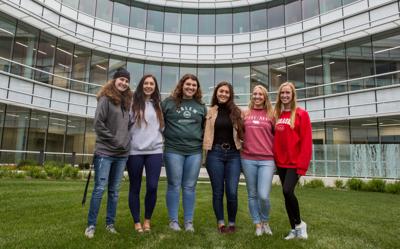Students at the University of Nebraska-Lincoln can take a class to become well-being coaches and help their peers overcome stressful situations.
Director of Big Red Resilience Connie Boehm formed the class within a matter of months after sophomore supply chain management major Peyton Walker approached her with the peer well-being coaches idea last spring.
Around 27 students are now taking the weekly, hour-long class after completing an application and interview process. These students will have one-on-one meetings with peers and help them overcome their challenges next spring.
“Going to [Counseling and Psychological Services] can sometimes be scary for some students because those are professionals,” Walker said. “Maybe you don’t want to meet with a professional. You just want to meet with somebody your own age or [someone] going through a similar situation that might be able to connect with you.”
Boehm said peer well-being coaching programs are popular across the country, but she and educational psychology graduate student Myrianna Bakou tailored this program to match UNL’s needs. Students are learning about well-being, positive psychology, character strengths and growth mindset through different activities and videos in class each week.
“It’s not counseling,” Boehm said. “We’re not diagnosing them. We’re working with them and … it’s always the student that we’re talking to; it’s their choice. If they want to look at their strengths, if they want to enhance their strengths, we’ll help them do that.”
According to Boehm, the coaches will be prepared to handle a variety of situations related to the nine dimensions of well-being, including suicide prevention. The coaches will follow a specific protocol for each meeting.
Boehm also said the peer coaches took the Values in Action Survey of Character Strengths at the beginning of the semester to see what skills they have and how they can best help their peers.
Students who wish to talk to a peer well-being coach can fill out an online form or walk in without an appointment. Boehm said she does not know where the students and peer coaches will meet yet, but there will be a Big Red Resilience staff member nearby to help the coach if needed.
Students utilizing this service will also have to take the VIA survey if they fill out the form beforehand. Students’ test results and forms will be taken into consideration so they can be matched with the most helpful peer coach. If they walk in without an appointment, they may be directed to take the test so they can overcome the challenge they’re currently facing by learning more about their strengths.
“It’s uplifting to see ‘Oh, I am good at that. I do have this to offer the world,’” Walker said.
Peer coaches will guide the student through the session by listening to the student and recommending services. Each meeting is specifically tailored to the needs of each student.
Walker said the program could help take the pressure off CAPS professionals because some students may not need to meet with a professional.
“It depends on the intensity of every matter,” Walker said. “One person handling a breakup, it could be good to talk to a well-being coach while others dealing with a breakup, they might need more professional care.”
Future well-being coaches said they enjoy learning about well-being, their classmates and themselves in the class. Junior psychology major Kimmy Montoya said she looks forward to the class every single week, and she can see students utilizing this service.
“I’m super proud of this whole Big Red Resilience thing,” Montoya said. “I’m super excited to be a part of it.”
Walker said she is thrilled about how the class has come together. She said she is thankful for the work of Boehm and Bakou.
“Connie is amazing,” Walker said. “She really took this to new heights. Getting us the building, starting the class so quickly … I had no idea that we’d be able to start this so soon.”
Boehm said the class is going well and she is excited for the program to come together.
“[I’m] feeling good about the team,” Boehm said. “I feel like they’re getting more excited about becoming a well-being coach and how they can help students.”

